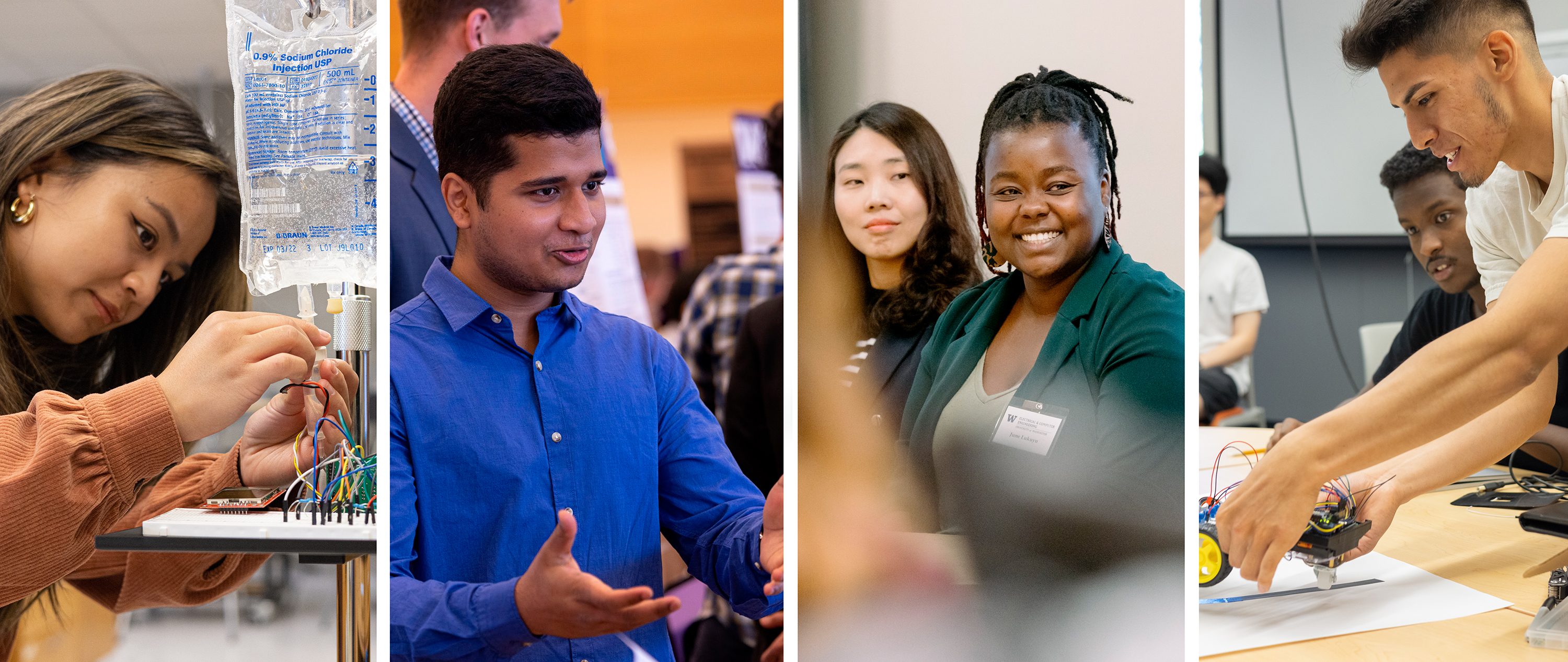Diversity, Equity, & Inclusion (DEI)
Students, staff, and faculty in the Department of Electrical & Computer Engineering at the University of Washington embody a variety of backgrounds, perspectives and lived experiences, and yet significant work is needed to create a department that: (1) represents the diversity of our state, country, and world; (2) provides equitable access to education and research opportunities; and (3) supports a sense of belonging and inclusivity among all who are a part of our UW ECE community. Oriented toward these goals are:
Vision
To further UW ECE’s mission to provide a top-ranked electrical and computer engineering department with a vibrant learning culture, it is essential that we lead and support a learning community of engineers that encourages and values the unique contributions from our community members.
The ECE department aims to recruit and retain a diverse student body, staff, and faculty that advances representation in the field of electrical and computer engineering. We seek to create an inclusive environment that fosters learning opportunities rooted in equity. The department strives to elevate and honor underrepresented voices that were historically excluded from spaces of education, especially engineering. These voices include but are not limited to diverse genders, ages, sexualities, abilities, races, ethnicities, socioeconomic backgrounds, national origins, immigration statuses, veteran affiliations, and other underserved individuals. UW ECE strives to promote a classroom, laboratory, and work climate that enables the well-being, learning, and the inclusion of staff, faculty, and students and their intersectional identities.
Consistent with our vision, UW ECE strategically invests in three major areas relevant to diversity, equity, and inclusion: (1) raising awareness about contemporary DEI issues; (2) actively supporting initiatives that improve DEI; and (3) gathering evidence to inform strategic planning of future DEI activities.
Strategic Plan (2024-2029)
The DEI leadership team is in the process of preparing a comprehensive strategic plan for the future that identifies the goals and objectives of UW ECE for diversity, equity, and inclusion over the long term. This process includes aligning our goals with those of the College of Engineering and the overall university climate.
DEI Leadership Team
The DEI advisory committee supports the Associate Chair in making balanced and impactful decisions regarding DEI within UW ECE. The committee has eight members in 2024-2025:
Associate Chair
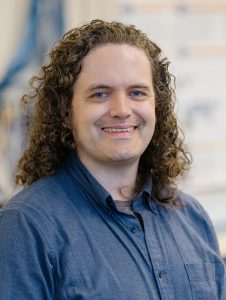
Sam Burden is an Associate Professor in the UW Department of Electrical & Computer Engineering (UW ECE) and is serving as Associate Chair for DEI for the second time. In his research, Sam is broadly interested in discovering and formalizing principles of sensorimotor control. Specifically, he focuses on applications in robotics, neuroengineering, and (human-)cyber-physical systems. Sam lives with chronic illness, and is happy to meet with anyone who identifies as disabled or chronically ill. For anything pertaining to his role as Associate Chair, please contact Sam at chair_dei@ece.uw.edu. For more personal conversations, please email sburden@uw.edu.
Committee members
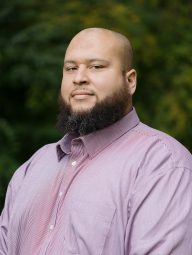
Robert Ayotte is the Payroll/Fiscal Coordinator at UW ECE. In this role, he supports faculty, staff, and students with their payroll needs, ensuring accurate and timely processing and addressing any related concerns. In addition to his responsibilities at UW ECE, Robert serves on the board of the Desmond Jackson Foundation. This foundation, established in memory of Desmond Jackson, provides educational scholarships to young Black men in the Seattle area.

Saachi Dhamija is a second-year undergraduate student majoring in electrical and computer engineering, specializing in the computing pathway. She actively conducts plasma research at the Flow Z-Pinch Lab and is a proud member of the Society of Women Engineers. Saachi is dedicated to promoting diversity, equity, and inclusion, striving to amplify underrepresented voices in technology and engineering fields.
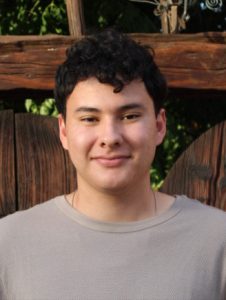
Jake Gonzales is a second-year Ph.D. student in UW ECE where he does research in developing decision-making algorithms for learning-enabled autonomous systems. Gonzales is committed to improving representation in engineering by improving avenues of support for minority groups. He is also interested in mentoring underrepresented students in autonomy, robotics, and AI, inspiring them to explore and innovate in these areas early in their careers. To this end, he was a TA for a DEI-focused course called Teaching Engineering, volunteered to provide feedback to prospective students through the graduate application support program (GASP), and mentored students from a local high school doing research in AI for a regional science fair.
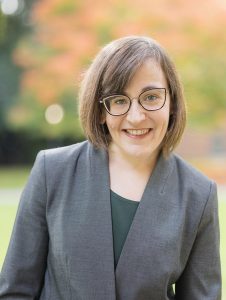
Amy Orsborn (she/her) is an assistant professor in UW ECE and in Bioengineering. She has been part of the DEI leadership team since the 2024-2025 academic year. She is particularly interested in interdisciplinary education and research, and addressing challenges in promoting diversity, equity, and inclusion when working at the intersection of traditional fields. She is a co-founder and part of the executive board of Women In Neural Engineering, which aims to increase inclusivity within neural engineering.
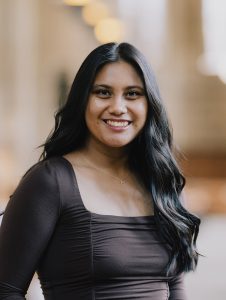
As the HR/Payroll Manager, Christie Peralta (she/her/they) works closely with UW ECE leadership, faculty, staff, and students to manage HR operations, recruitment, payroll, records management, and process improvement. Christie is committed to leveraging her existing skills and growing her knowledge base to help promote a supportive work environment. She is currently co-leading the ECE DEI Book Club with Lauren Van Fossen, Assistant Director of Undergraduate Student Services.
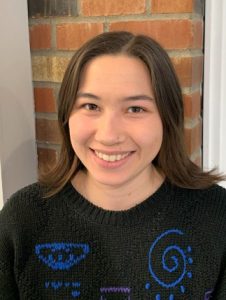
Annika Pfister is a second-year Ph.D. student in the Ingraham Lab, studying assistive robots for human mobility. She is also a student member of the Center for Research and Education on Accessible Technology and Experiences (CREATE) and is the outreach chair for HuskyADAPT, a student-run organization for accessible design and play technology. Annika is dedicated to helping foster accessible, inclusive, and collaborative environments for research and learning.
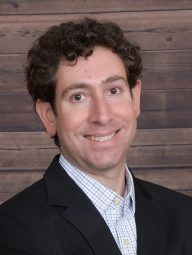
John Raiti is an Associate Teaching Professor in UW ECE and is the Technical Programs Adviser at the Global Innovation Exchange (GIX), where he teaches in the Interdisciplinary UW Master of Science in Technology Innovation degree program. He teaches UW graduate level courses in Sensors & Circuits, IoT and Connected Devices, Capstone-style Launch Projects, and Robotics (Mobility, Navigation, and Manipulation) with a focus on Human-Robot Interaction (HRI). Project examples from courses he has taught can be found here.

Priyanka Senapati is a third-year undergraduate student majoring in electrical and computer engineering at UW, with a focus on digital design and computing. As an active member of her sorority’s DEI committee, she upholds the diversity statement and standards of Phi Sigma Rho, striving to empower women and minorities to excel in engineering. Priyanka is dedicated to increasing the participation and representation of underrepresented groups within her organizations and amplifying their voices through equitable and inclusive practices.
New Initiatives (2024-2025)
We have announced a call for proposals for Community Building Initiatives – please consider applying!
Ongoing Programs
Emergency Student Support Fund
Led by Whitney Thomas, Academic Counselor – Senior for Undergraduate Programs
The ECE Student Emergency Support Fund provides ECE students somewhere to turn to when they have nowhere else to go to ask for help. Students may submit requests for unexpected situations, such as health care costs, car repairs, legal fees, travel for family emergencies, stolen goods, and housing and food insecurity. This program has provided students with funds that have helped them meet basic needs, allowing them to continue with their studies. The Emergency Student Support Fund also seeks to demonstrate genuine care and concern for students. In cases where funds cannot be awarded, students will be directed to other resources that may be of assistance. The fund has been described as a “lifeline for students” by recipients. For more information about this program, please visit the website for the emergency support fund.
DEI Conference Travel Support Fund
Led by Stephanie Swanson, Director of Academic Services
The DEI Conference Travel Support Fund provides support for students to travel to conferences that provide networking and professional development opportunities for underrepresented minorities (for example – WE for women engineers, SHPE for Hispanic engineers, etc.). It also supports students of any race, ethnicity, or gender to attend or present DEI-related papers at conferences in their field which provide substantive training and education opportunities on contemporary DEI topics. For more information about this program, please visit the website for the DEI Conference Travel Support Fund.
Understanding the Student Experience
Led by Denise Wilson, Professor
Because ECE is the largest department in the College of Engineering with 767 undergraduates, 268 daytime graduate students (133 MS and 135 PhD) and 260 professional MS students, it is important for the department as a whole to take a more formal approach to understanding the student experience at all levels – BS, MS, and PhD. To this end, this effort conducts annual, semi-structured interviews of a representative sample of students (rotating through the BS, MS, and PhD student populations year-to-year) with the goal of gaining a greater understanding of both the strengths of our programs and the challenges that students face as they pursue their degrees. This information is invaluable for helping us to strategically allocate resources for continuous improvement of our curriculum and learning environment. For more information about this ongoing program, contact Professor Wilson at denisew@uw.edu.
Past Initiatives (2020-2024)
Support for ECE Students with Learning Disabilities
Led by Sep Makhsous, Assistant Teaching Professor
This project aims to explore the potential of large language models (LLMs) as an accessible learning tool to support engineering students with disabilities in UW ECE. By adapting LLMs to accommodate various disabilities, such as visual, hearing, and cognitive impairments, this effort aims to create an inclusive and equitable learning environment that facilitates academic success for all students. For more information about this exciting new initiative, please contact Professor Sep Makhsous at sosper30@uw.edu.
UW ECE Cap and Gown Loan
Led by John Nettles, (former) Assistant Director of Academic and Career Services, PMP
This initiative will enable the purchase and distribution of caps and gowns to undergraduate and graduate students who face financial barriers to purchasing graduation regalia. This initiative funds the purchase of an initial batch of caps and gowns which will be supplemented in subsequent years by donations from students who have graduated from UW ECE.
Graduate Student Outreach
Led by Felix Schwock, PhD Student and Azadeh Yazdan, Associate Professor
This initiative seeks to build a community for ECE graduate students that fosters socialization and builds a sense of belonging and inclusiveness, ultimately enhancing overall well-being during the graduate experience. Various activities, such as coffee chats, brainstorming sessions, informal research or mentoring meetings, and practice spaces for milestone, conference, and job presentations are conducted under this initiative. These efforts will transcend the boundaries of predefined labs and bring together graduate students from diverse backgrounds.
Curriculum Reinvention
Led by Daniel Kirschen, Professor with invaluable support from other committee members:
Staff: Charlotte Goddard, Chris Overly and Stephanie Swanson
Faculty: Payman Arabshahi, Eric Klavins and Arka Majumdar
As part of an effort to establish an undergraduate ECE degree program, a committee was formed in 2020 to make major changes to the undergraduate curriculum. This committee prioritized lowering barriers for transfer students, who constitute approximately one-third of our graduates and are more likely to be members of underrepresented groups than direct-to-college students. The BSECE curriculum changes have been implemented over the course of a 5-year transition period that began in the Autumn quarter 2022.
AVELA Outreach and Community Building
Led by Liban Hussein and Kyle Johnson, UW ECE Graduate Students
The UW Student Organization AVELA (A Vision for Electronic Literacy & Access) has used UW ECE DEI initiative funds to support AVELA members in teaching STEM topics to underrepresented minority students in the K–14 grade range in 2022 and 2023. Funds have also been invested in developing materials and curricula to sustain future teaching activities in the STEM pipeline. In so doing, AVELA supports UW ECE in retaining current students while also reaching out to the next generation of STEM students and encouraging them to apply to UW ECE in the future. AVELA works to provide academic resources and opportunities in STEM to underrepresented minority students in partnership with a wide range of URM affinity groups on the UW campus.
DEI Courses
EE397: Sex, Gender, and Engineering
EE397 focuses on issues that women, sexual minorities (LGB), and gender minorities (TQ+) face in the engineering workplace and at school including but not limited to lack of belonging, marginalization, and sexual harassment. The impact of normative and numerical male dominance, hypermasculine work culture, personality characteristics of engineers, gender identity threat, and the nature of engineering work is examined alongside potential solutions to the disadvantage that these under-represented groups face in engineering. EE397 is a three-credit course that has the University DIV (diversity) designation and is offered alternating academic years. For more information about this course, contact Professor Denise Wilson at denisew@uw.edu.
EE406: Teaching Engineering
EE406 provides an introduction to best practices associated with teaching engineering courses in college. Topics include how students learn in college, active learning, problem-based learning, student evaluations of teaching, and teacher-student interactions. Although content knowledge is an essential ingredient to good teaching, it does not alone ensure a good teaching experience for students and teachers alike. Nor does the same teaching strategy work the same for everyone. This course will look at proven pedagogical practices including problem-based learning, cooperative learning, and other active learning practices that can support better quality of instruction in a variety of engineering learning environments. EE406 addresses how to build good working relationships with students in the context of a supportive teaching climate and modern-day educational practice and technologies. The course carries the University diversity designation and integrates inclusive teaching practice into topical content and skills development over the duration of the course. As part of the course requirements, students develop and design a learning activity on an engineering topic of their choice that implements concepts and teaching skills emphasized in the course content. No specific prerequisite technical knowledge is required to take the class. For more information about this course, contact Professor Denise Wilson at denisew@uw.edu.
DEI Research
Women in Engineering Work
While a great deal of research on women in engineering focuses on external factors that may prevent women from remaining or thriving in engineering, our research focuses more on what’s going on psychologically – on the unmet or thwarted needs that hamper the efforts of women and non-binary engineers to fully thrive in engineering work and school. Our research applies components of self-determination theory or SDT to understand what women (and non-binary individuals) experience in the engineering classroom and in the workplace relative to men using both qualitative, interview-based research methods and quantitative, survey-based methods. For more information on this research, contact Professor Denise Wilson at denisew@uw.edu.
Diversity
Gender Diversity
The disciplines of Electrical, Computer, and Electrical and Computer Engineering have historically lagged behind other engineering disciplines in terms of the number of females enrolled at colleges and universities in the United States. In ECE at the University of Washington, however, the number of women in our BS, daytime MS, and PhD programs exceeds the national averages. Over 25% of our faculty are also female, exceeding the national average in Electrical, Computer, and Electrical and Computer Engineering programs, which on average, are only about 15% female. While the representation of females is much higher than many other ECE programs in the country, we nevertheless understand the need to better understand why gender parity remains elusive in ECE and we continue to work toward recruiting and retaining more females at all levels as well as better understanding the gender gap.
Undergraduates in Bachelor’s Degree Programs
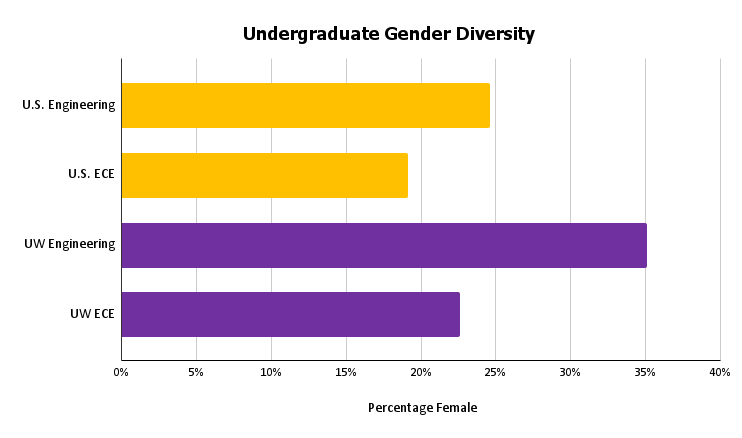
Graduate Students in Master’s Degree Programs
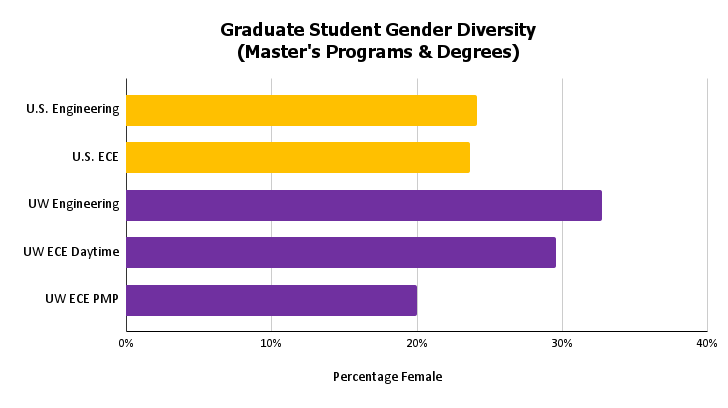
Graduate Students enrolled in Ph.D. Programs
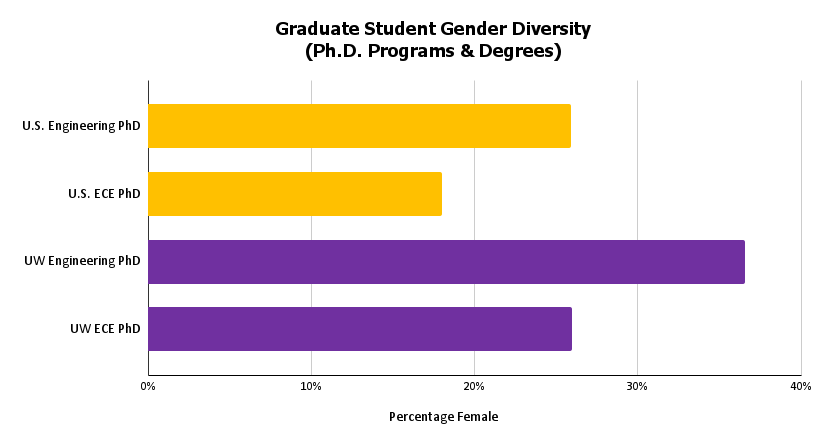
In the above data,
- UW ECE: percentage of females enrolled as of fall 2023 in Electrical and Computer Engineering at UW according to UW registrar data.
- UW Engineering: percentage of females enrolled as of 2023 in all engineering disciplines at UW according to UW registrar data.
- U.S. ECE: percentage of degrees awarded to females between July 2020 and June 2021 (enrollment data not available) according to ASEE by the Numbers.
- U.S. Engineering: percentage of females enrolled in all engineering disciplines between July 2020 and June 2021 (enrollment data not available) according to ASEE by the Numbers.
- PMP: professional (fee-based) master’s program in UW ECE
Resources
Frequently Asked Questions
I feel uncomfortable walking around campus at night. What can I do?
Husky NightWalk provides safe vehicle escort at night (from 6:30 p.m. to 2 a.m.) with a uniformed security guard for students, faculty and staff. Guards can also assist with building and office lockouts (proper identification required) and jump start dead car batteries. The purpose is to help students and employees get to and from campus safely. For more information or to schedule an escort, click here.
I feel uncomfortable in lab or class and it affects my motivation to attend. What can I do?
If your experience is related to bias or harassment, see the interactive chart on bias and harassment in UW ECE for next steps. If you are not sure if your experience falls within bias or harassment or you feel uncomfortable making a formal report, please feel free to contact any member of the DEI Leadership Team (names and contact information located on the UW ECE DEI main page).
I notice that students from underrepresented groups are rarely listened to in class, is there any way I can help?
If you are interested in participating in research related to addressing marginalization of underrepresented groups, please contact Prof. Denise Wilson (denisew@uw.edu); if you would like to be a part of UW ECE’s DEI Leadership team and support underrepresented groups through activities and programs within UW ECE, please feel free to contact any member of the DEI Leadership Team (names and contact information located on the UW ECE DEI main page).
I notice that one of my classmates feels uncomfortable / is being singled out, but I’m afraid to step in myself, how can I help?
If you feel comfortable there are strategies to amplify the voices of marginalized individuals. If you would like to learn more about being an effective ally, please feel free to contact any member of the DEI Leadership team (names and contact information located on the UW ECE DEI main page). There are also some proven and accessible strategies for intervening as a bystander to inappropriate behavior in school and at work.
I often don’t know where my next meal will come from. Is there any help I can get from the department?
UW ECE offers emergency support to qualified students who cannot obtain such support elsewhere. Apply for emergency student support funding here. Any Hungry Husky also provides support to those students in need.
There is a policy/practice that has resulted in unfair treatment. How do I let leadership know about this and how can I advocate for a change to the policy/practice?
Connect with UW ECE leadership via the student advisory council, Associate Chair for DEI, Associate Chair for Education, or the UW ECE chair.
I want to learn more about DEI topics, grow as an ally and/or talk with others also interested in this area. Where do I start?
Join the UW ECE DEI Book Club (contact John Nettles for more information) participate in a community conversation (contact the Associate Chair for DEI for upcoming conversations), join our DEI Leadership Team, or please feel free to contact any member of the DEI Leadership Team (names and contact information located on the UW ECE DEI main page).
Individual Support for Students
Dealing with harassment or inappropriate behavior in UW ECE
UW ECE has created an interactive guide to help you understand and navigate possible options for dealing with any incidents of harassment or bias as a member of the ECE community. Bias refers to discrimination or harassment based on perception of identity (e.g. race, gender, religion, ability) while harassment refers to systematic/continued unwanted and annoying actions of one party, including threats and demands. Access the interactive guide here.
UW’s Incident Reporting tool
This form is for non-emergency incidents. If your immediate safety is at risk or you perceive imminent harm to yourself or others, please call 911. UW SafeCampus is also available for non-emergency incidents on Monday through Friday, 8 a.m. – 5 p.m. excluding UW holidays.
Call 206-685-7233 to anonymously discuss safety and well-being concerns. This includes support following experiences of sexual assault, sexual harassment, stalking, and/or relationship violence.
Bias, discrimination and sexual harassment reporting and resources
This form is for more extreme incidents with a focus on bias, discrimination and sexual harassment. If you are in danger, please call 911 immediately.
Mental health services
SafeCampus will listen to your concerns and provide guidance and safety plans tailored to your situation. These trained professionals will talk you through options and connect you with additional resources if you want them. For more information, give us a call or visit our What to Expect page.
The UW Counseling Center is dedicated to its work, seeking ways to enhance the UW Student Community’s access to wellness resources within and beyond UW. They strive to create a safe environment for students to explore and overcome challenges connected to life and learning.
Student Support Organizations
ECE students can find opportunities for community and support within an array of organizations, including many that connect engineers from specific racial, cultural, and diverse backgrounds.
IEEE
The UW Student Branch of the Institute of Electrical and Electronics Engineers’ (IEEE) mission is to foster a community within the Electrical & Computer Engineering Department through various networking and social events with one another and engineers in the industry.
UW ECE Student Advisory Council (ECE-SAC)
The main goal of the ECE-SAC is to be a platform for students to voice concerns, serve as a communication channel between the student body and the department, and provide resources for building a better community in the whole ECE student body. The SAC differs from IEEE/HKN and the GSA in several aspects: SAC’s main focus is not only on professional development but also on community building and creating a sustainably welcoming environment for the whole student body. ECE-SAC can be reached at sac@ece.uw.edu.
National Society of Black Engineers (NSBE)
NSBE is a dynamic and fun, student-managed organization that strives to offer programming to enhance the academic, professional and social development of its members. NSBE seeks to play a pivotal role in the development of the next generation of engineers and scientists through our Pre-College Initiative programs. NSBE can be reached at uwnsbe@uw.edu
Society of Advancing Chicanos and Native Americans in Science (SACNAS)
SACNAS enables and encourages its members to share information, resources, and participate in peer-to-peer mentorship, as well as to take part in opportunities to give back to their communities and develop leadership skills. The annual conference and regional meetings provide venues for chapter members from universities and communities across the country to connect with one another. SACNAS can be reached at sacnas@u.washington.edu. Official membership is not required to partake in UW SACNAS events.
Society of Hispanic Professional Engineers (SHPE)
The mission of SHPE is to promote the pursuit of STEM fields for underrepresented minorities and give back to our communities. The UW SHPE chapter is passionate about empowering young Hispanics to become professionals in their STEM pursuits and believes in the power of a supportive community and to engage students in developing in their academic career. SHPE can be contacted at shpe@uw.edu.
Society of Women Engineers (SWE)
Founded in 1950, the Society of Women Engineers (SWE) is the world’s largest advocate for women in engineering and technology. SWE UW hosts programs and events to help over 500 students build their network and achieve their full potential as engineers. SWE UW seeks to provide a supportive environment for people of all genders to network and grow as engineers by bridging the gap between college and career. SWE can be reached at swe@uw.edu.
Other Support Services
UW Disability Services
Our mission is to provide leadership to the University community in achieving employment and educational access for individuals with disabilities.
UW Diversity Minor Program
25 credits total. A maximum of 10 credits from a department may be applied toward the Diversity Minor, including the student’s major. A minimum of 15 credits must be completed in residence at the UW. For a complete list of course options, see the courses page.
UW Q Center
We facilitate and enhance a brave, affirming, liberatory, and celebratory environment for students, faculty, staff, and alumni of all sexual and gender orientations, identities, and expressions.
UW Women’s Center
The UW Alene Moris Women’s Center is a catalyst for change. We disrupt cycles of oppression and break down gender-based barriers through transformational education programs, leadership development, and advocacy for girls and women.
UW Student Organizations
The HUB is a department within the Division of Student Life, is funded in part by the Services and Activities Fee (SAF) and relies on its professional and student staff to carry out its mission to enrich student engagement.
